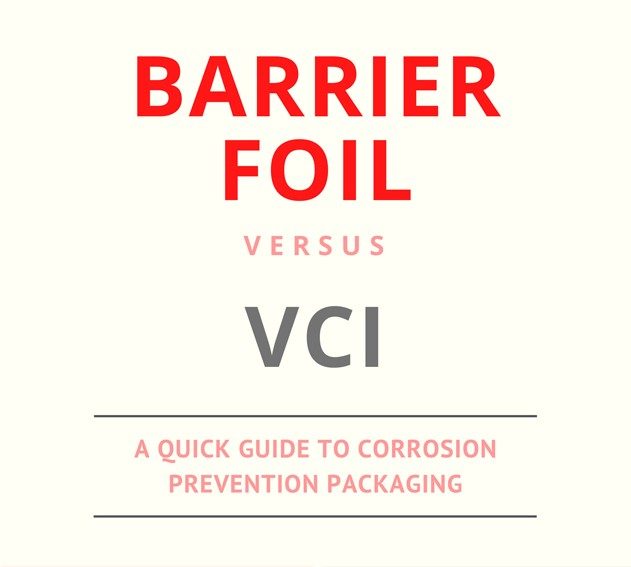
Our Quick Guide for Corrosion Prevention Packaging
Barrier foils or VCI packaging, which is better for you? Corrosion prevention packaging is vital for the protection of some of your largest projects, but how can you be sure that your products are safe from corrosion? In 2013, the U.S. determined that approximately 276 billion dollars worth of corrosion damage occurred annually. Every year, products exposed to water-vapor moisture and other potentially corrosive elements lead to the damage of some of this country’s largest products and affecting your company’s bottom line.
If your company ships or exports machines, you know that you must take special care of these products. But did you know that is not the only way your products can become susceptible to corrosion? Whether you have to store metallic goods, ship unassembled parts or even if you are an original equipment manufacturer (OEM), you know the woes of corrosion damage all too well.
That’s why we decided to put together a quick guide to corrosion packaging. There are different types of corrosion prevention packaging, and you should know your best options for protection. We will discuss barrier foils and volatile corrosion inhibitors (VCI) and the differences between these two common packaging materials.
Barrier Foils vs VCI: What Are They?
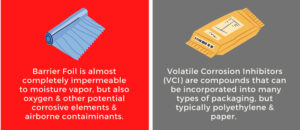
If you have ever had to deal with fighting corrosion, we’re sure that you’ve heard of barrier foil packaging or VCI. But what exactly are they? They both prevent corrosion, does it matter which one you use?
Barrier Foil Packaging
Barrier foils are composed of 3 to 4 layers of different materials. These materials are bonded together with adhesive or extrusion polyethylene and derive their properties from a strong construction as outlined in the below diagram. This type of packaging is almost completely impermeable to moisture vapor and other potentially corrosive elements or airborne contaminants. When combined with desiccant, the packaging can provide the exact corrosion prevention system for the time the products will spend in transit/storage (even up to 20 years or more!).
VCI
Volatile corrosion inhibitors (VCIs) are chemical compounds that can be incorporated into many different types of packaging but typically are seen with polyethylene and paper. In places where the VCI film is in direct contact with the metal, VCI molecules adsorb on the metal surfaces, creating an invisible molecular barrier against corrosive elements such as oxygen, moisture, and chlorides. When using VCI packaging, products can typically be stored for up to 3 years, however, the packaging must stay intact, and not be opened.
Barrier Foils vs VCI: How Do They Work?
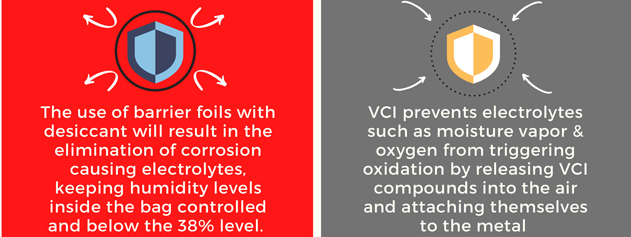
These two types of packaging work very differently to help protect your products. It’s up to you to figure out what is most important to you. Do you need to ship your products overseas or store them for a long period of time? Both types of material can offer different protections to your products.
Barrier Foil Packaging
This type of packaging acts as a barrier to outside contaminants including moisture vapor. It also can help control the humidity levels inside the packaging and keep levels below the critical 38%, the level at which corrosion of metallic parts will occur. When used with clay desiccants, the residual moisture vapor inside the barrier bag (at the time of sealing) will be absorbed. The desiccants will continue to absorb any amount of moisture vapor that permeates through the barrier foil, allowing you to tailor your corrosion prevention for us to 20 years.
So if you’re looking for a long-term solution to storage or transport, barrier foils are the superior choice. You can even add humidity indicators to the packaging. This will show the internal humidity levels can be monitored externally without the need to open the bag.
VCI
On the other hand, VCI is done through a chemical process to prevent electrolytes, such as moisture vapor or oxygen from triggering the oxidation process on metallic surfaces. The VCI compounds are released into the air and molecules attach themselves to the metal surface to form an invisible thin film layer that can last several years. There have been studies that show certain VCI compounds can be potentially harmful to humans. Please be mindful when using these compounds. Most responsible manufacturers have eliminated the use of these compounds but always do your research for safety.
Barrier Foils vs VCI: Which Is Right For You?
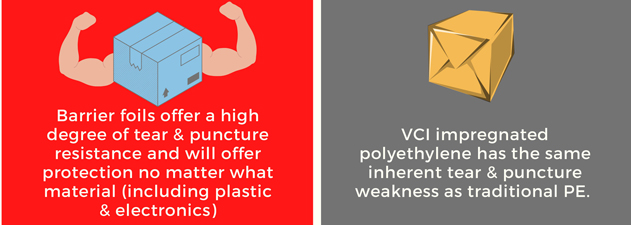
Depending on your needs, one of the above packaging options may be right for you. You know what your needs are better than anyone else, so if you plan on shipping your products overseas, or storing them for a long period of time, barrier foils might be the best option for your product’s protection. However, if your products are only taking a short trip, VCI packaging might work best.
Barrier Foil Packaging
Foils offer a high degree of tear and puncture resistance, offering protection no matter the size or shape. The combined use of desiccants and barrier foils will result in the elimination of corrosion-causing electrolytes. Not just the hope that they won’t affect your products. Desiccants inside the barrier foil bags provide corrosion protection to metallic surfaces, no matter the metal. This form of protection can also provide corrosion prevention to non-metallic parts such as plastics and electronic components. And since the activated clay in desiccants is organic, there are no special disposal instructions that need to be followed.
VCI
Packaging made with VCI is only as strong as the material used (i.e. paper or polyethylene). Even though the compounds form a protective barrier on the metallic surface, they only protect against some of the corrosion-causing contaminants that can affect products during transit and storage. Remember: VCI allows the corrosion-causing electrolytes to still exist but hopes to counter the presence of corrosion-causing elements. Some VCI compounds can be considered a health hazard, so you may be required to dispose of the packaging accordingly (at a potentially great cost to you).
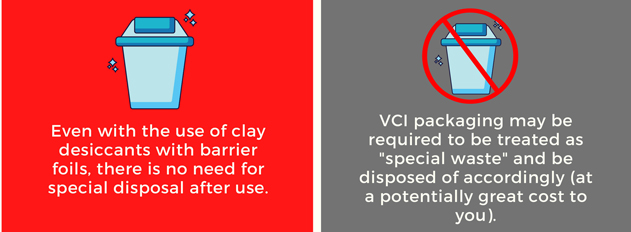
In Conclusion
There are a ton of factors that can lead to corrosion damage. However, knowing how to combat them will help you in the long run. No matter the size, shape, shipping or storage duration, there is always a way to protect your most vulnerable products from corrosion. Most importantly, remember to make sure you research which packaging will be the best for your situation and products. If your job is small and will only be in transit for a short time, VCI may work best for you. In a similar fashion, if you are looking for a long-term solution with less hassle, barrier foils will be a better solution. Contact us today to start protecting your products from corrosion with barrier foils from 3D Barrier Bags Inc.
For the full and shareable version of our guide click here.
3D Barrier Bags is an essential business proudly serving critical packaging to pharmaceutical, medical, diagnostic and food sectors industries. We are located in Orlando Florida, and we proudly manufacture our products in the USA. We have remained open and fully active throughout the Coronavirus Pandemic and will continue to serve essential industries. Call or email us today for a quote.
